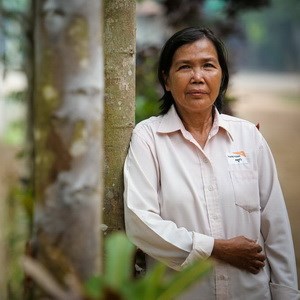Defending the Defenseless
Sokchan Keng is a director of various youth and children's clubs in the Leuk Daek region of Cambodia. Though she lost her father to disease and eleven family members to the Cambodian genocide, Chan has dedicated her life to caring for and protecting youth in her community from hunger and trafficking.
"My dream is to see the youth in my country become a generation who can continue on in their studies and go on to defend and serve the people of Cambodia," Keng says. "They are the ones who can bring growth, peace, and happiness to our nation."
This is one of the reasons Sokchan Keng is called "Ming Chan" (Auntie Chan) by many of the children in her town. She believes in them, and works toward building a safer community for them daily to ensure their futures are full of possibilities.
Sokchan's chance for a prosperous future was nearly taken from her at age 15 when her family was forcibly removed from their home and taken to a commune in Phnom Penh. The eviction was part of the Khmer Rouge regime's military takeover of Cambodia's capital city. This began a dark period for Sokchan and her family, who endured hard labor, starvation, and torture under the oppressive Communist regime. "We were living in hopelessness," Sokchan says.
Over the next four years, Cambodia was thrown into chaos while private property was confiscated, the national currency was abolished, and families were separated and taken to work camps and security centers. Nearly 2 million Cambodians were executed or died from lack of adequate food or medical attention. Sadly, much of Sokchan's family can be included in this number: she lost her father, four of her siblings, three siblings-in-law, and four of her nieces and nephews to various illnesses and violence.
A broken nation
Though the genocide ended in 1979, Cambodia is still affected by its grim history today. "People are traumatized and the leaders aren't unified," Sokchan says. "People do not dare to express their thoughts. People are selfish. National treasures like our culture and infrastructure were destroyed, and we're left with only anger, poverty, and despair."
This instability is part of the reason why Cambodia is now a global hot spot for human trafficking. Thousands of women and children are trafficked each year from Vietnam and China to work in Thailand or in the brothels of Phnom Penh. Women and children are used for sexual exploitation. Men and boys are trafficked for forced labor. And many of the young people are sold into exploitation by their own parents.
Auntie Chan
As a director of various youth clubs in her community in the rural Leuk Daek district, Auntie Chan serves youth from ten area villages in three communes. Over a decade ago, World Vision founded these clubs to provide children with safe places to play and make friends. The programs also teach youth important information about child rights, human trafficking, gender and domestic violence, and HIV.
Sokchan sees her role not only as a coordinator but as a partner and a friend. A large part of her role is interacting with the children's parents. "I can see that communities I have been working with have changed in terms of their thoughts, habits, and the way parents raise their children," Sokchan says. "People in my community used to stop children from going to school, and they used violence against children. Children weren't given opportunities to raise their ideas, but I see this changing. Children are encouraged to go to school and join society activities. The children and youth are forming groups to protect their rights, and in the meantime, their parents are forming groups to protect children."
Her vision for these children goes beyond her hometown. Sokchan wants to see a brighter future for the entire coming generation of Cambodians, and she thinks support from the national government will be key in causing widespread impact. In her town of Leuk Daek, the government has a strategic committee for the protection of women and children, and Sokchan has been working to get a representative from her group into their monthly planning meetings. This is the first step, says Sokchan, in the process of uniting youth associations across Cambodia.
Part of what attracted Sokchan to work with World Vision as a community group coordinator was the love that she saw through their ministry. And it was this same love, shown through her coworkers, that led her to follow Christ. That was thirteen years ago. Reading and reflecting on the Bible is now an important part of Sokchan's routine.
"God helps me work successfully," says Sokchan, "and reading his Word encourages me to protect the children. God's Word is full of love, respect, grace, forgiveness, and non-discrimination."
Sokchan is a woman living out her calling, rooted in Psalms 82:3–4: "Give justice to the poor and the orphan; uphold the rights of the oppressed and the destitute. Rescue the poor and helpless; deliver them from the grasp of evil people."
"I'm not married," Sokchan says, "but God has given me a lot of children."
Amber Stenberg is TCW's editorial intern. Follow her on Twitter @stenberg_a.
Subscribe to TCW's free email newsletter at this link for weekly updates and chances to win free books and music downloads.
Read more articles that highlight writing by Christian women at ChristianityToday.com/Women
 Read These Next
Read These Next
 Harley Davidson Provides Water For LifeHow the owners of the most successful Harley Davidson dealership in the country are using their business to bring clean water to communities around the world
Harley Davidson Provides Water For LifeHow the owners of the most successful Harley Davidson dealership in the country are using their business to bring clean water to communities around the world
 The Secret to Raising Sexually Pure KidsIgnorance about sexual issues is simply too dangerous for our children today.
The Secret to Raising Sexually Pure KidsIgnorance about sexual issues is simply too dangerous for our children today.
 Uncoupled in a Coupled-Up WorldLife after divorce is lonely—even when you’ve got Jesus.
Uncoupled in a Coupled-Up WorldLife after divorce is lonely—even when you’ve got Jesus.








 Homepage
Homepage
